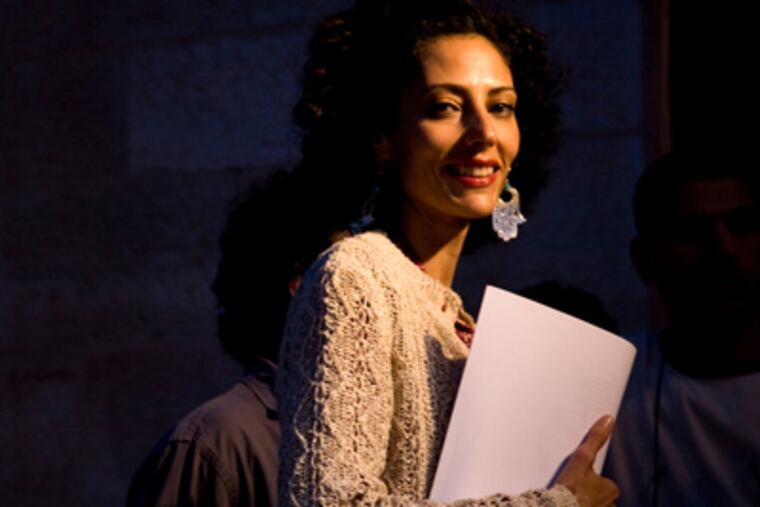Poet in an Arab garden: Suheir Hammad to perform at Al-Bustan Seeds of Culture concert
'We like to experiment," says Hanna Khoury. "We're always looking for new challenges - and this is going to be an especially interesting one."

'We like to experiment," says Hanna Khoury. "We're always looking for new challenges - and this is going to be an especially interesting one."
Khoury is music director of the Arab Music Concert Series, put on by the West Philadelphia-based nonprofit Al-Bustan Seeds of Culture. Friday's concert, at Trinity Center, 22d and Spruce Streets, features a resident takht ensemble playing traditional Arab music, one in a series with guest soloists.
Friday's guest will be not a traditional musician but the much-praised Palestinian American poet Suheir Hammad. She often reads to music - but this time, she'll deliver her distinctive, hip-hop-inflected verses, in English, in a bed of traditional Arab music.
A surprising combination? Khoury likes it.
"One of the pieces she is doing, 'Gaza Suite,' treats a topic that brings in many different elements from home," Khoury says. "So having traditional music performed with it makes a lot of sense, as she speaks of Gaza and Bethlehem. It goes very well with the music of the region."
Hammad says by e-mail that "it will be a new experience. My poems have accompanied several genres over the years, and I'm hoping both the music and the poems will birth new sound and meaning by coming together. Let's hear what happens."
Khoury, born in Israel, is a rarity - a violinist exquisitely trained in both Middle Eastern and Western classical music. He has played with and for everyone from Daniel Barenboim to Shakira to Mandy Patinkin to Youssou N'Dour. "When my family and I speak of 'classical music,' we mean Arab traditional music," he says. "When we want to talk about Beethoven, we call it 'Western music.' "
Hammad was born in Amman, Jordan. When she was 5, her parents moved to Brooklyn, N.Y., and from there to Staten Island, where Hammad grew up hip-hop.
So the keynote is diversity, with an eye on bringing Arab music to a wider public.
Al-Bustan means "The Garden" in Arabic. Founded by Hazami Sayed in 2003, it has gone from a summer camp to a center for year-round arts programs dedicated to presenting and teaching the Arab language and culture. Khoury began a series of small-group Arab music concerts last spring, and in May, a grant of $50,000 from the John S. and James L. Knight Foundation enabled Al-Bustan to take the next step: a concert series to bring audiences the music on a regular basis.
Khoury and company have developed a range of community events featuring these precious sounds, including a memorable concert in March, in which 140 singers from Swarthmore College, the Wilmington Children's Chorus, and John Moffet Elementary, Motivation High School, Northeast High School, and Science Leadership Academy schools sang, in Arabic, the music of Marcel Khalife. Over 10 weeks, at a variety of sites, Khoury and percussionist Hafez El Ali Kotain trained the singers.
"People were inspired at so many non-Arab kids singing in Arabic," says Khoury, "and it sounded pretty great. So we have resources at the community level, and we are building up a repertoire, a forum for the music, and a fan base. But still, it's not quite enough."
What is enough? For Khoury, it's the establishment and institutionalization of a takht, or chamber ensemble, of top-notch Arabic musicians, on instruments such as the lute-like oud, the zither-like qanun, and the flute-like nay. The takht will complement a larger group of community-based players.
Friday's concert will feature the community ensemble, then the takht, and then poet Hammad.
Hammad is a spoken-word artist whose breakout moment came in 2002 on Russell Simmons' Def Poetry Jam on HBO. Simmons, astonished by her poem "First Writing Since," about her reaction to 9/11, signed her to be a performer and consultant. She appeared both in the stage show and in the HBO version. Her startling, unforgettable poem "Not Your Erotic, Not Your Exotic," addresses a person who fantasizes about her and her difference, unable to see her as a human being:
my otherness my hair
wasn't put on top of my head to entice
you into some mysterious black voodoo
the beat of my lashes against each other
ain't some dark desert beat
it's just a blink
get over it
Sayed says everyone at Al-Bustan had been fans of Hammad's for a long time. So, evidently, was Alberto Ibargüen, president and CEO of the Knight Foundation. "He had seen her perform at TED Women in December 2010 [in Washington] and was very moved by her work," Sayed says. Last May, at the ceremony awarding Al-Bustan the grant, Ibargüen suggested Sayed get Hammad involved.
In October, Al-Bustan brought Hammad to Philadelphia for a day of workshops with students at Parkway Northwest and Science Leadership Academy, as well as with a group at Penn's Greenfield Intercultural Center. She challenged students to think about their social selves and the selves they saw around them. Central to it all was writing and what it can accomplish.
"I learned from them more than I think they learned from me," Hammad says. "When generations truly communicate, I think the dimensions open onto each other."
"This is the music I was born and raised in," says Khoury. "And these shows are for anyone who wants to hear it and learn more."